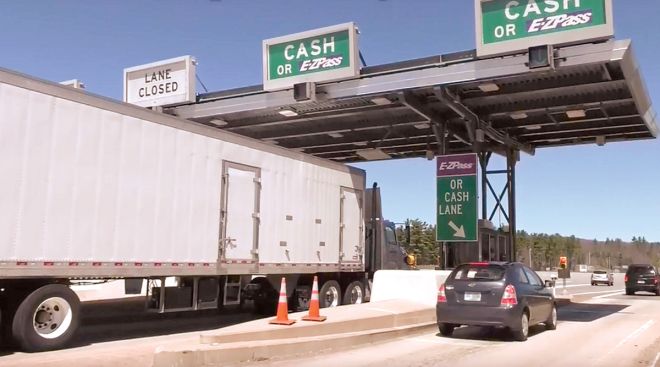In September of 2022 a judge ruled that RhodeWorks failed to fairly apportion its tolls among bridge users. (HummelReport via YouTube)
Trucking and business groups have asked a federal circuit court to reject an appeal seeking reinstatement of Rhode Island’s trucks-only tolling plan, agreeing with a federal district judge who in September struck down the plan as unconstitutional.
The groups that have so far filed amicus curiae briefs in support of American Trucking Associations’ legal challenge to the tolling plan include 48 state trucking associations, the U.S. Chamber of Commerce, the Truckload Carriers Association, Natso, and several others.
“Together, amici represent tens of thousands of highway users and beneficiaries of national highway systems, which have been critical to the free flow of commerce and the economic dynamism of the United States,” said a court filing by attorney Prasad Sharma, of the law firm of Scopelitis, Garvin, Light, Hanson & Feary, P.C., on behalf of several groups. “Instead of designing a fair, user-based scheme to raise its revenue goals, Rhode Island started with the foundational premise that it would be more politically palatable to make out-of-state users foot the overwhelming majority of the bill,” stated the court brief.
The tolling plan, known as “RhodeWorks,” was the first and only program in the United States to only toll Class 8 trucks, according to ATA’s supporters in the lawsuit. The program, which has tentatively been shut down until the lawsuit is fully adjudicated, administered tolls only to motor carriers traveling through the state. The lawsuit that led to the blocking of the program, filed in 2018 by ATA and two motor carriers, alleged that the plan required out-of-state heavy trucks to pay nearly all of the tolls, while exempting state businesses, cars and intrastate motor carriers. The trial for ATA’s lawsuit ended June 13, 2022, after two weeks of testimony.
William Smith, the district judge in the case, ruled in September of last year that since RhodeWorks failed to fairly apportion its tolls among bridge users based on a fair approximation of their use of the bridges, it was enacted with a discriminatory purpose, and is “discriminatory in effect, under the dormant Commerce Clause of the United States Constitution.”
In a 181-page appeal, filed Feb. 10 with the U.S. Court of Appeals for the First Circuit, the Rhode Island Department of Transportation asked that Smith’s decision declaring the program unconstitutional be reversed, and that oral arguments be held on the case.
In its amicus filing opposing the appeal, the U.S. Chamber said the issue is critical to its business members, who engage in commerce across the country and rely on interstate trucking.
“It is hard to think of a clearer case of intentional discrimination: a state agency proposed a tolling regime already designed to disproportionately burden interstate commerce, but politicians expressly reacted to protectionist concerns even more precisely to tailor the regime to narrowly target interstate commerce,” the Chamber brief said. “It is eminently apparent that, in changing course following local outcry, Rhode Island lawmakers intended to protect local business at the expense of out-of-state business interests. This is unconstitutional.
“If RhodeWorks were allowed to stand, its discriminatory toll system would become a dangerous blueprint for other states to fund in-state projects by extracting revenue from out-of-state commercial interests. Such a holding would greatly undermine and disrupt the national free trade arena created by the Commerce Clause.”
The appeals court has not yet said when, or if, it will schedule oral arguments.






